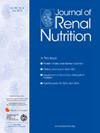Effects of Alpha-Lipoic Acid Supplementation on Weight Loss, Inflammatory, Lipid, and Hematological Levels in Patients With Chronic Kidney Disease: A Systematic Review and Meta-Analysis of Randomized Controlled Trials
IF 3.2
3区 医学
Q2 NUTRITION & DIETETICS
引用次数: 0
Abstract
Objectives
The effects of alpha-lipoic acid (ALA) supplementation on cardiovascular-related factors have been evaluated in a number of randomized clinical trials, with different results. Thus, in this meta-analysis, the effects of ALA on blood levels of inflammatory, lipid, and hematological markers as well as anthropometric indices in patients with chronic kidney disease (CKD) were evaluated.
Methods
Five electronic databases were used to conduct a comprehensive search through October 2023. Risk of bias assessment and data extraction were carried out separately by 2 reviewers on the included papers. The data were analyzed using the random-effects model in meta-analyses. The data were analyzed using the random-effects model in meta-analyses. We assessed inter-study heterogeneity with I2 and Cochran's Q test.
Results
Nine of the 421 potential reports were included. Using random-effects models, no significant changes were observed in weight loss, body mass index, hemoglobin, and iron following ALA supplementation (600 mg/day). Results exhibited that ALA significantly reduced high-sensitivity C-reactive protein levels in individuals with CKD (weighted mean difference (WMD) = −2.91 mg/L, 95% CI: −4.65, −1.17, I2 = 50.5%, P = .09); however, there were no significant variations in levels of interleukin-6 (IL-6) or malondialdehyde. Regarding lipid profiles, findings revealed that ALA administration had no significant impact on high-density lipoprotein cholesterol and triglycerides levels among patients with CKD. However, compared to the control group, total cholestrol levels were considerably lower in CKD patients (WMD = −5.48 mg/dL, 95% CI: −10.55, −0.41, I2 = 0.0%, P = .50). Moreover, the sensitivity analyses showed that pooled WMDs for low-density lipoprotein cholesterol levels were significantly changed (−6.88 mg/dL, 95% CI, −12.78, −0.98).
Conclusions
These findings revealed that ALA supplementation slightly but significantly reduced blood levels of high-sensitivity C-reactive protein, total cholestrol, and low-density lipoprotein cholesterol, but did not affect IL-6, malondialdehyde, high-density lipoprotein cholesterol, weight, body mass index, iron, and hemoglobin in patients with CKD.
补充α-硫辛酸对慢性肾脏病患者体重减轻、炎症、血脂和血液学水平的影响:随机对照临床试验的系统回顾和元分析。
背景和目的:多项随机临床试验(RCT)评估了补充α-硫辛酸(ALA)对心血管相关因素的影响,结果各不相同。因此,本荟萃分析评估了 ALA 对慢性肾脏病(CKD)患者血液中炎症、血脂和血液学指标以及人体测量指数的影响:方法:使用五个电子数据库进行全面检索,检索期至 2023 年 10 月。两位审稿人分别对纳入的论文进行了偏倚风险评估和数据提取。数据采用随机效应模型进行荟萃分析。荟萃分析采用随机效应模型对数据进行分析。我们用 I2 和 Cochran's Q 检验评估了研究间的异质性:421 项潜在报告中有 9 项被纳入。使用随机效应模型,发现补充 ALA(600 毫克/天)后,体重减轻、体重指数(BMI)、血红蛋白(Hb)和铁(Fe)均无明显变化。结果显示,ALA 能明显降低慢性肾脏病患者的 hs-CRP 水平(加权平均差 (WMD) = -2.91 mg/L,95% CI:-4.65,-1.17,I2 = 50.5%,P = 0.09),但白细胞介素-6(IL-6)或丙二醛(MDA)水平没有明显变化。在血脂谱方面,研究结果显示,服用 ALA 对慢性肾脏病患者的高密度脂蛋白胆固醇(HDL-C)和总胆固醇(TG)水平没有明显影响。然而,与对照组相比,CKD 患者的 TC 水平明显降低(WMD = -5.48 mg/dL,95% CI:-10.55,-0.41,I2 = 0.0%,P = 0.50)。此外,敏感性分析表明,LDL-C水平的集合WMD也发生了显著变化(-6.88 mg/dL,95% CI:-12.78,-0.98):这些研究结果表明,补充 ALA 能轻微但显著地降低血液中的 hs-CRP、TC 和 LDL-C 水平,但不会影响 IL-6、MDA、HDL-C、体重、BMI、铁和血红蛋白。
本文章由计算机程序翻译,如有差异,请以英文原文为准。
求助全文
约1分钟内获得全文
求助全文
来源期刊

Journal of Renal Nutrition
医学-泌尿学与肾脏学
CiteScore
5.70
自引率
12.50%
发文量
146
审稿时长
6.7 weeks
期刊介绍:
The Journal of Renal Nutrition is devoted exclusively to renal nutrition science and renal dietetics. Its content is appropriate for nutritionists, physicians and researchers working in nephrology. Each issue contains a state-of-the-art review, original research, articles on the clinical management and education of patients, a current literature review, and nutritional analysis of food products that have clinical relevance.
 求助内容:
求助内容: 应助结果提醒方式:
应助结果提醒方式:


